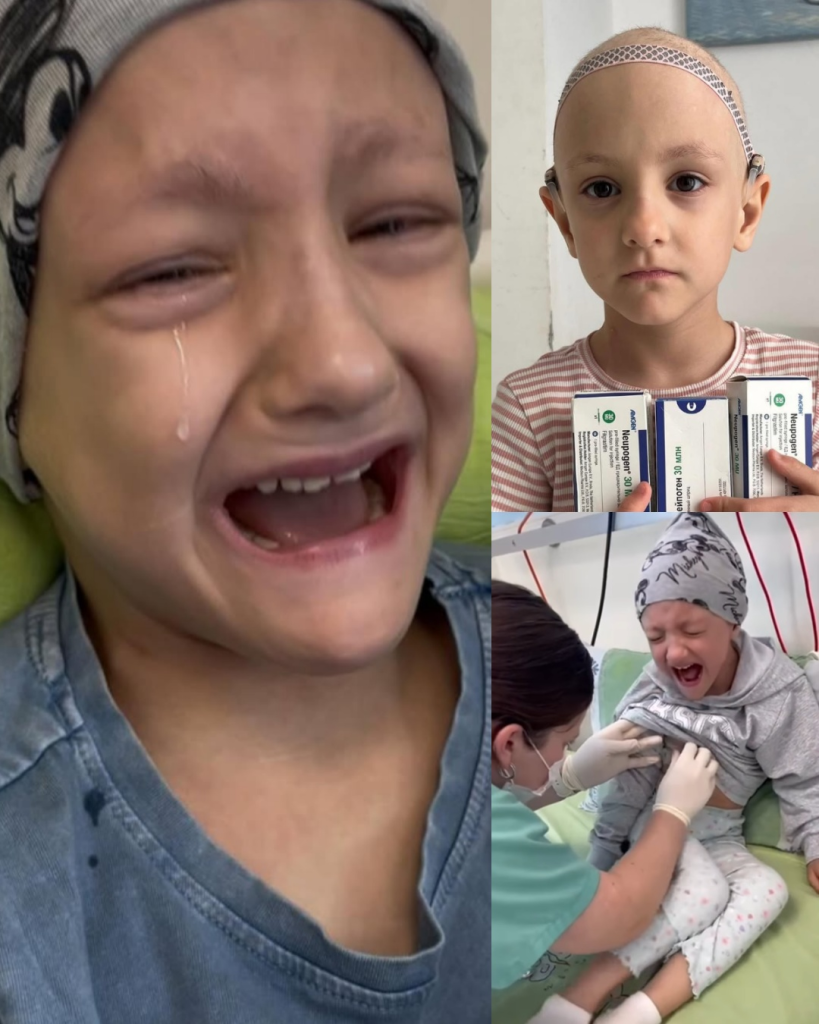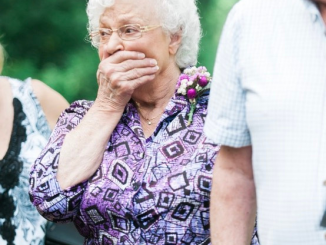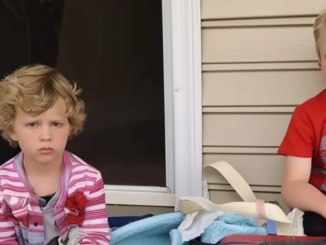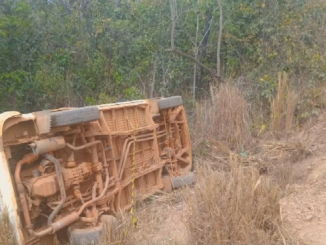
She was only five years old, but her eyes carried the weight of someone who had already lived a lifetime of battles.
Her name was Alivia — a child who smiled through pain, who laughed between chemo sessions, who held her grandmother’s hand and whispered, “Don’t worry, Grandma, I’ll be okay.”
But cancer doesn’t care about courage. It doesn’t care about innocence. And for one tiny girl and her grandmother, it would become a storm too powerful to outrun.

A Family Left Behind
When Alivia’s illness began, there was no warning — just the quiet signs that something wasn’t right. She grew tired easily, her appetite faded, and one day her stomach began to swell. Doctors ran tests, and what they found shattered her grandmother’s world:kidney cancer.

For most families, there are parents, siblings, relatives to share the weight of fear. But for Alivia, there was only her grandmother.
Her mother had disappeared long ago, and her father was never in the picture.

The two of them — one small child and one aging woman — were all they had.
“Since the day she was born, she’s been mine,” her grandmother said softly. “I promised I would protect her. I just never knew I’d have to fight something like this.”

The Surgery That Saved — and Changed — Everything
The doctors made a quick decision: her right kidney had to be removed, along with the tumor that was wrapped around it like a shadow.
It was the only way to give her a chance.

The surgery lasted hours. Her grandmother sat in the waiting room, clutching a small stuffed bear that Alivia had namedMr. Buttons. She prayed silently, her lips trembling with each breath.

When the doctor finally emerged, his expression was gentle but heavy.
“The surgery was successful,” he said. “But the road ahead will be long.”

Alivia had survived the operation, but her body had paid the price.
One kidney gone. Dozens of stitches. Tubes, wires, and the sterile smell of antiseptic surrounding her like a second skin.

Still, when she opened her eyes, the first thing she asked was, “Can I go home soon?”
Her grandmother smiled through tears. “Not yet, sweetheart. But soon.”

The Unforgiving Reality of Cancer
Cancer is cruel — not just because it attacks the body, but because it takes everything else too: money, time, energy, and hope.
Alivia’s treatments continued — chemotherapy, radiation, painkillers, and nearly twenty different medicationsthat no five-year-old should ever have to take.
The hospital became her home. The nurses became her family. And the sight of needles, pills, and IV drips became her new normal.

Some days, she was brave — joking with the nurses, coloring with her left hand while the right was connected to an IV line.
Other days, she cried quietly into her grandmother’s lap, whispering, “I just want to feel better.”

Her grandmother would stroke her hair, whispering back, “You will, my love. You will.”
But deep down, she wasn’t sure.

A Battle Against Time and Debt
The medical bills piled up faster than the treatments.
With no parents to help, no job that could keep up with hospital visits, and no savings left, Alivia’s grandmother faced an impossible choice: pay for medicine or keep a roof over their heads.

“The hospital says we must pay before they continue treatment,” she said in tears. “But if we stop… she won’t survive.”

The words hung heavy in the air — because it wasn’t just about money anymore. It was about a life.
Her doctor confirmed what she already knew:
“The cancer is aggressive. If she doesn’t continue treatment immediately, it will come back — stronger, faster.”

There was a donor fund that could help, but it required urgent payment to proceed. Each day of delay meant less chance of survival.
It was a race against time — and against the cruelty of a system where a child’s life can hinge on a number printed on a bill.

The Girl With the Lion Heart
Despite everything, Alivia refused to give up.
She loved the color yellow — she said it reminded her of sunshine. Even when her skin turned pale and her hair fell out in patches, she asked her grandmother to bring her yellow ribbons. “They make me feel brave,” she said.
She dreamed of becoming a doctor one day — “so I can fix other kids like me.”

The nurses called her “Little Sunshine.” She called herself a “fighter.”
When the pain got bad, she would close her eyes and imagine herself running through a field of flowers, chasing butterflies.
In her dreams, she could still run. She could still breathe without tubes, laugh without pain.

Every morning, she would greet the nurses with a weak but determined smile:
“Good morning! I’m still here!”

The Grandmother’s Promise
Her grandmother never left her side.
She slept on a folding chair beside the hospital bed, her back aching, her hands clasped in prayer. Every night she kissed Alivia’s forehead and whispered, “You’re safe, my angel. Grandma’s here.”

But she also knew what the doctors had told her — that time was running out.
Without continued chemotherapy, the cancer would spread. Without enough money to cover the next stage, all their battles would mean nothing.
“I’ve already lost so much in this life,” she said softly. “I can’t lose her too.”

A Cry for Help
The hospital’s message was clear: if the bills weren’t paid soon, the treatments would have to stop.
That’s when the grandmother turned to the world — not out of pride, but out of desperation.

“I don’t have anything left,” she wrote in a letter. “But I have hope. Please, if you can, help me keep my granddaughter alive.”
She wasn’t asking for miracles — just for mercy. For one more chance to see her little girl smile again, to hear her laugh, to feel her heartbeat against her chest.

The Weight of a World on Small Shoulders
By now, Alivia’s tiny body was weak. Her veins bruised from injections, her skin paper-thin. But her eyes — those eyes — still burned with life.
When visitors came to bring toys or treats, she would always give away what she could. “There are other kids here too,” she’d say. “They need it more.”

That was Alivia — giving even when she had nothing left to give.
One nurse recalled, “She told me once that she wasn’t afraid of dying. She was afraid her grandma would be alone.”

The Unthinkable
The day the machines went quiet was the day the world stopped for one old woman.
Alivia’s heart, so strong and brave, simply couldn’t take it anymore.
She passed peacefully, her grandmother holding her hand, whispering prayers through tears.

“She went in her sleep,” the nurse said softly. “She wasn’t in pain.”
But for her grandmother, the pain will never end.
The bed is empty now. The toys sit untouched. The yellow ribbons are folded neatly in a box beside a framed photo — one that still radiates the same warmth Alivia brought into every room.

What Remains
Even in death, Alivia’s story continues to move hearts.
Her grandmother still visits the hospital to bring small gifts to other children — coloring books, snacks, blankets.
“She would have wanted me to,” she says. “She always shared what little she had.”

And every time she sees a little girl wearing yellow, she smiles through her tears.
“For a moment, I see her again,” she whispers. “My sunshine.”

The Lesson She Left Behind
Alivia’s story isn’t just about cancer. It’s about courage. It’s about love that doesn’t break under the weight of tragedy.
She was only five — too young to understand life or death — yet she taught everyone around her what it truly means to fight.

Her spirit reminds us that even in the darkest places, light can exist. That hope doesn’t need a cure to survive.
Because sometimes, strength looks like a child holding on to her grandmother’s hand and whispering, “I’ll be okay.”
And sometimes, love looks like a grandmother refusing to let go — even when the world tells her it’s time.

She lost her kidney. She lost her battle. But she never lost her light.
And maybe that’s what Alivia’s story really is — not one of death, but of defiance.
Because even now, somewhere beyond the pain, the little girl who loved yellow still shines.






Leave a Reply